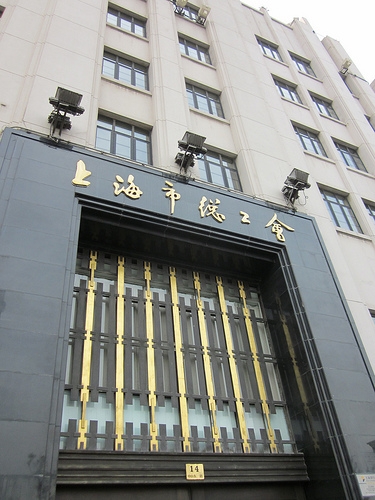
Check out the intelligent network infrastructure in Bank of China's Tianjin office
12,600 outlets inside offices and the data center were connected.
Bank of China’s new office in Tianjin is a key part of its national business network. To support its advanced data center, banking applications and intelligent building systems, the bank wanted a high-performance, intelligent network infrastructure.
CommScope delivered this with its range of SYSTIMAX solutions, combining performance and reliability with ease of installation and management.
Here's more from CommScope:
Bank of China is one of the world’s top ten banks, providing a full range of financial services in China and 31 other countries. The bank offers corporate, investment and personal banking, and financial market facilities as well as fund management, aircraft leasing and insurance services through wholly-owned subsidiaries.
Tianjin is in northern China, and as the country’s sixth largest city is a major business center for Bank of China. The scale of the bank’s new office in the city reflects its importance, with 90,000m2 of high-quality workspace in a 25-floor tower and six-floor adjacent building.
The Tianjin building is state-of-the-art throughout, featuring intelligent building systems and an advanced data center. These facilities, like all the building’s data and voice systems, depend on a world-class network infrastructure with more than 12,000 information outlets.
During planning of the Tianjin office and its systems, selecting the best network infrastructure solutions was a priority. The bank required industry-leading performance combined with the highest level of reliability; it also wanted a supplier with a global reputation for quality and technical support.
Among the alternatives considered, CommScope stood out for its excellent product range and its record of success with large-scale installations. Its banking customers in China already included Shanghai Bank, Union Pay and Bank of China’s own Shanghai data center, Beijing Heishanhu data center, Shanxi branch, Hebei branch and numerous others.
Demanding requirements
Specifications for the Bank of China installation were particularly demanding. They required a single integrated copper and fiber infrastructure that could support the data center, intelligent building systems and advanced banking applications. Among the more specific requirements: optical fiber cabling must achieve a loss of less than 2dB in a five-connector channel.
To monitor and manage the network physical layer, Bank of China wanted an intelligent infrastructure that would improve security and make troubleshooting easier. It also needed to cut the time and cost of making moves, additions and changes to the network.
All this had to be achieved by an infrastructure that could be installed in a very tight schedule. The data-center component of the infrastructure, for example, had to be completed in only a month.
CommScope and its local partners met these needs with its SYSTIMAX portfolio of solutions. As one of the world’s leading structured cabling brand for more than three decades, it continues to lead the industry in performance and innovation.
Less downtime
Included in the SYSTIMAX range is CommScope’s advanced iPatch intelligent infrastructure solution, which gives system managers knowledge and visibility of the physical layer that enables them to optimize network utilization and uptime. When changes are implemented, it helps technicians complete moves, additions and updates faster — with fewer errors.
Both copper and fiber connections are routed though iPatch patching panels that connect via rack manager units to PCs on system managers’ desks. Managers can monitor connections and connected devices in real time and receive instant alerts of any unauthorized changes. They can also raise change orders on their iPatch PC software and display instructions to technicians using iPatch screens on the patching frames.
Managers are notified as soon as changes are correctly completed and network diagrams in the iPatch database are automatically updated. This makes allocating new connections much easier and enables instant location of connection problems.
By avoiding human error and making accurate information on connections immediately available, the iPatch solution reduces network downtime. At the same time, it improves network security, which is critical in banking applications.
An added advantage of the iPatch solution is that it makes the bank less dependent on the specialized knowledge of individual technicians. Since complete and accurate data on all connections and connected devices is instantly available, new managers and technicians can quickly become familiar with the network.
Fast fiber installation
The LazrSPEED 550 cabling used in network backbones was the first multimode fiber solution to meet the OM4 standard. It enables data transmission speeds of 10Gb/s over 550 metres and supports 40/100G Ethernet over shorter distances. Its laser-optimized design can achieve this without expensive electronics, improving savings on overall infrastructure cost.
For fast installation, Bank of China chose the factory preterminated InstaPATCH version of LazrSPEED. Compared with on-site termination, this solution fulfils their high bandwidth needs while also protecting up to approximately 50 percent of their investment on fiber cabling infrastructure. The small size and low loss of InstaPATCH connections makes them ideal for the high connector densities required in data centers.
Horizontal connections to outlets in office areas use the GigaSPEED XL copper solution. This exceeds specifications of Category 6 cabling standard by 6dB, allowing 1Gb/s data transmission over 100 metres with up to six connectors in the channel. This extra performance ensures that the bank’s large, complex infrastructure will deliver the end-to-end data speeds users need.
Quality design and installation
In total, the project team connected 12,600 outlets inside offices and the data center, using more than 450km of GigaSPEED XL cabling. In the network backbone and risers, they installed 6km of LazrSPEED 12-fiber Optical Fiber Nonconductive Riser (OFNR) cables.
The LazrSPEED backbone cable connects two main distribution frames to 25 satellite distributors located throughout the building. From these satellite frames, the GigaSPEED cabling is run under floors and above ceilings to outlets in the work areas.






















 Advertise
Advertise






